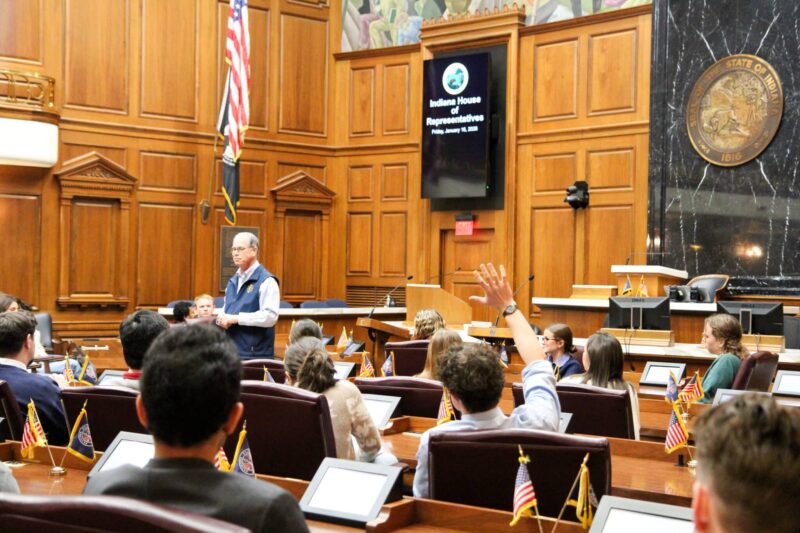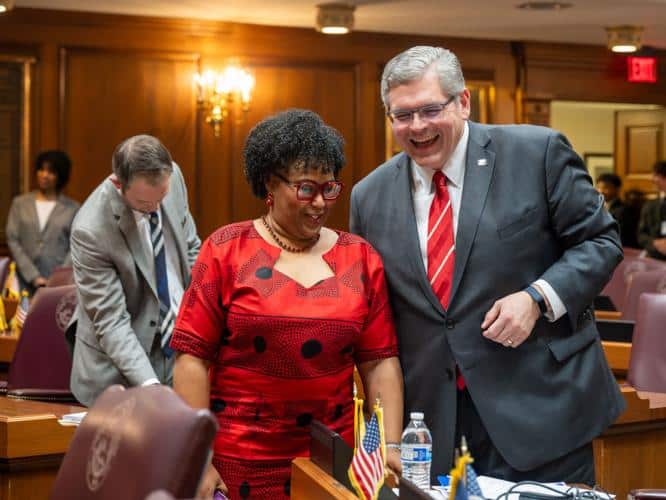They were the voice of business. They believed that scant government regulation and low taxes would lead to economic growth. They placed their faith in law and order and were quick to reject any innovation or expansion of government power—particularly in the executive branch—as a violation of either the U.S. Constitution or the Indiana Constitution.
They prided themselves on being strict constructionists of those august documents and derided any attempt to overcome, circumvent or work around any part of those fundamental charters as an offense as great as heresy.
Reasonable people could and did disagree with these core GOP beliefs. Reasonable people also could question, as I did from time to time, their faith in the business community as an entirely benevolent force in American life.
But there never was any doubt that their faith in those principles was genuine—and deeply felt.
Now, it’s difficult to know who Hoosier Republicans are or what they believe.
More than 80 of them trooped off to Washington to meet with President Donald Trump in the White House. They did so because Trump summoned them.
He wants to find a way to manufacture extra GOP seats in the U.S. House of Representatives by gerrymandering ever more aggressively—and in some cases, illegally and unconstitutionally—in Republican-leaning states. His hope is that, by keeping the House in Republican hands, he will avoid investigations into the various schemes and scams that have dominated his second tenure in the White House.
It’s easy to understand Trump’s motivation.
He ran for the presidency in 2024 in large part to avoid facing the consequences of his serial lawbreaking during his first tenure as commander-in-chief.
Less easy to fathom is the reasoning of the Hoosier Republicans who seem eager to outsource their thinking, ethics and convictions to the first convicted felon in American history to occupy the Oval Office.
Consider the case of Indiana Rep. Jim Lucas, R-Seymour.
When the idea of redistricting in Indiana in the middle of the census cycle first surfaced, Lucas was loud in his opposition to the notion. (Well, he’s always loud.)
Lucas long has proclaimed that he is among the strictest constructionists of our constitutions, particularly the sections dealing with firearms, who ever lived. He was an absolutist about that, he said.
So fervent was his absolutism that, on a radio show I hosted, he once refused to rule out the notion that individual citizens had a constitutional right to own nuclear weapons. (Imagine just how much better the world would be if terrorists had a constitutional right to possess weapons of mass destruction.)
Lucas was among the Hoosier Republicans who, tails wagging, hustled to the White House when Trump whistled.
Afterward, Lucas began to modulate his tone. He said he wasn’t ready to say yes to the president yet, but he wasn’t as determined to say no.
His shifting of position, he said, was because Trump had demonstrated that Democratic gerrymandering was so widespread that it demanded a reaction in kind from Republicans.
There are several ways to respond to that.
The first is to note that it isn’t true.
Gerrymandering has received considerable objective study. The analysis of that data vary slightly—one report lists 10 of the 11 most gerrymandered states as favoring Republicans, while others drop the ratio to eight or nine out of 10—but, overall, findings are the same.
Gerrymandering benefits Republicans more than it does Democrats.
And Republicans rely on gerrymandering more than Democrats do.
There’s also the rationalizing aspect of Lucas’ justification. He said violating the Indiana Constitution—which prohibits redistricting between times when the census is taken—might be okay because Democrats have gerrymandered, too.
Well, if that’s the case, wouldn’t the deaths of schoolchildren and other innocents by the thousands justify reconsidering absolutist notions regarding the right to possess deadly weapons?
I mean, if one section of the state constitution can be ignored or reconsidered, why can’t others?
The problem here isn’t just Lucas.
Eighty GOP elected officials headed off to Washington to consider doing the president’s bidding, even though doing so would violate the oaths of office they took.
The Indiana Republicans I have respected the most—Richard Lugar, Mitch Daniels, etc.—wouldn’t do that.
But this is a different Hoosier GOP.








